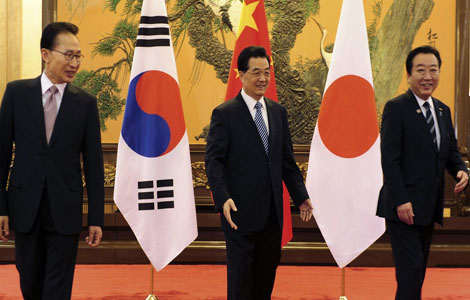Countries eye trade agreement
Updated: 2012-05-15 03:57
By Li Xiaokun and Zhang Yunbi (China Daily)
|
||||||||
 President Hu Jintao, the Republic of Korea President Lee Myung-bak (left) and Japan's Prime Minister Yoshihiko Noda pose for photographers during their meeting in Beijing on Monday. [Photo by y Kim Byong-man / Yonhap via reuters] |
After Beijing, Tokyo and Seoul announced plans on Sunday to start talking about a trilateral free trade agreement this year, a joint declaration released on Monday said the three countries also have set their sights on reaching a trade pact that will apply to all of East Asia.
The proposed trilateral agreement, if brought into existence, will provide a path leading to a broader East Asian agreement, a high-level diplomat and Chinese experts have said.
Premier Wen Jiabao, Japanese Prime Minister Yoshihiko Noda and President of the Republic of Korea Lee Myung-bak signed a "milestone" trilateral investment agreement on Sunday during an annual meeting. The pact came as the result of years of negotiations and paved the way for trilateral talks on a free trade agreement.
They also announced that talks on a proposed trilateral agreement, which would exercise influence on a fifth of world trade, are to begin this year.
The joint declaration said the three countries should immediately prepare for the talks.
Moreover, it said the Association of Southeast Asian Nations, or ASEAN, Plus Working Groups need to be established "without delay" to speed up discussions about establishing a comprehensive regional economic partnership that will take into account "the initiatives of the East Asia Free Trade Area and Comprehensive Economic Partnership for East Asia".
The three nations have long said they are willing to reach a trade pact with ASEAN.
The existing free trade agreement between ASEAN and China is the largest such agreement in the world measured by the population it concerns and third largest measured by nominal GDP. It came into effect on Jan 1, 2010, and has since helped to bring about a huge increase in bilateral trade.
The joint declaration also said China, Japan and the ROK have "fully realized" how important cooperating among themselves is, especially as the world economy remains grim and the situation in West Asia and North Africa remains turbulent.
"In that regard, we agree unanimously to further strengthen the three nations' forward-looking comprehensive cooperative partnership," the declaration said.
President Hu Jintao also met Lee Myung-bak and Yoshihiko Noda on Monday.
Luo Zhaohui, director of the Foreign Ministry's department of Asian affairs, told reporters on Monday that the start of talks on the trilateral free trade agreement is "a historical achievement and a strategic breakthrough".
"And we hope the trilateral agreement can pave the way toward an East Asian agreement," he said.
Once a trilateral trade pact is signed, "the establishment of an East Asia agreement will be nearly assured", Luo said.
Economic cooperation will fill the three nations with more feelings of mutual trust, he said.
Liu Jiangyong, vice-dean of the Institute of Modern International Relations at Tsinghua University, said the approaching negotiations on the proposed trilateral trade agreement "are the key to the future trade agreement talks of ASEAN+3" and will contribute to the establishment of an East Asian community.
"Given the fact that we already have an ASEAN free trade agreement and ASEAN-China trade agreement, the trilateral agreement will be the last step for an East Asia agreement," he said.
"Although it will be a process full of difficulties, it will finally forge an economic community in East Asia, which will be a milestone in building a real East Asian community."
Qu Xing, director of the China Institute of International Studies, said the proposed trilateral agreement and regional integration will encourage the three nations to share natural resources, helping to reduce tensions.
"Territorial disputes among the three nations have given rise to more bad feelings in recent years," Qu said. "But if natural resources recovered in one country can be used by another country, a system used by some European nations, I believe confrontations stemming from territorial disputes will become far less common."
Some observers, meanwhile, have said the formation of a free trade agreement among China Japan and South Korea will introduce a competitor to the Trans-Pacific Partnership, a free trade agreement that applies to the Asia-Pacific region and is supported by the United States. Qu said more communication and less confrontation among the three Asian nations do not go against US interests.

 Relief reaches isolated village
Relief reaches isolated village
 Rainfall poses new threats to quake-hit region
Rainfall poses new threats to quake-hit region
 Funerals begin for Boston bombing victims
Funerals begin for Boston bombing victims
 Quake takeaway from China's Air Force
Quake takeaway from China's Air Force
 Obama celebrates young inventors at science fair
Obama celebrates young inventors at science fair
 Earth Day marked around the world
Earth Day marked around the world
 Volunteer team helping students find sense of normalcy
Volunteer team helping students find sense of normalcy
 Ethnic groups quick to join rescue efforts
Ethnic groups quick to join rescue efforts
Most Viewed
Editor's Picks

|

|

|

|

|

|
Today's Top News
Health new priority for quake zone
Xi meets US top military officer
Japan's boats driven out of Diaoyu
China mulls online shopping legislation
Bird flu death toll rises to 22
Putin appoints new ambassador to China
Japanese ships blocked from Diaoyu Islands
Inspired by Guan, more Chinese pick up golf
US Weekly

|

|






